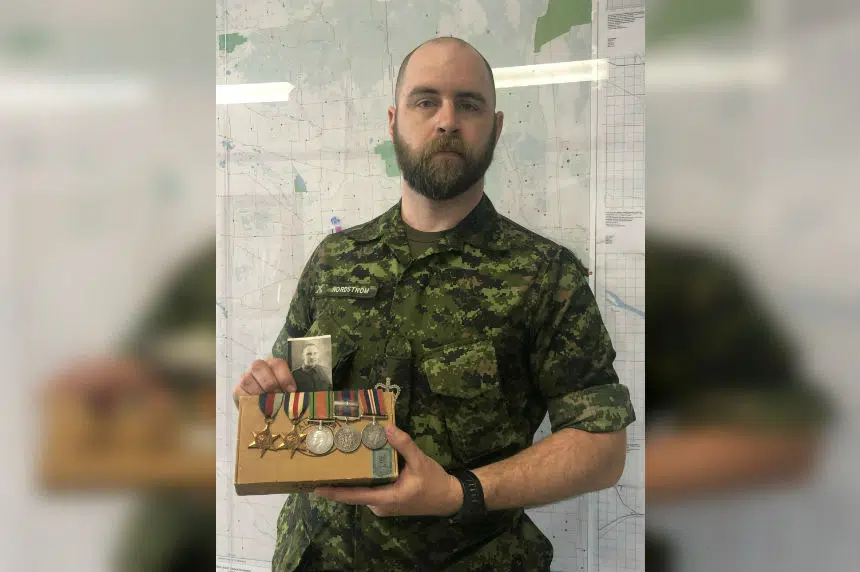The Canadian veteran lived an unassuming, simple life, driving a bus for a living in the sunny Golden State.
But Nordstrom, like many thousands of soldiers, stepped off a landing craft assault (LCA) on June 6, 1944 and helped change the course of history.
And now 75 years later, his great-nephew stands in the same building, the Regina Armoury, where the story began.
Peter Nordstrom unfolds a letter, yellowed and worn at the edges. It is the poetic, poignant recollections of Evert’s memories of D-Day, written years after the events, when he could finally summon the strength to find the words.
“Here were no umpires to assess our casualties — only the grim reaper to count out the heroic total. This was war and it was being played for keeps,” Evert wrote.
“These ‘D’ day names, so vivid in the memory of those who fought for them may mean little to anyone else. One fact however does stand out: the 1st Battalion Regina Rifle Regiment was the first unit in the Canadian Army to reach and hold their objectives.
” ‘Reaching’ was not too bad, but ‘holding’ was HELL. But there was no sign of weakening during the eleven days and nights that they held on grimly, repulsing counter-attack after counter-attack. As their bodies tired, their confidence in themselves rose. When relief came on the eleventh day, they knew they had crossed swords with the best the enemy had to offer. They felt that as a unit they had assumed the full stature of manhood.”
It is something many us can’t even begin to imagine, but for Peter, it feels like life has come full circle. He is a warrant officer with the Royal Regina Rifles, standing in the storied shadow of his great-uncle and his D-Day comrades.
Admittedly, like many men of that time, Evert didn’t share much about his experiences on D-Day or any other time during his service.
“He had survivor guilt and he didn’t talk about it,” Peter said.
But small, handwritten journals Evert wrote, numerous black-and-white photographs of his time in Europe and his five medals paint a picture of the monumental sacrifices he and thousands like him made.
Evert told Peter’s father of the moment German snipers took their aim on the beach and mortar shells rained down upon the Canadians.
“He saw that first round land and he realized the next one would hit him and he moved and a couple of buddies didn’t survive,” Peter explained. “And that is tough, right? You only have seconds to process information and sometimes you act without really having a chance to reach out and grab your guy, your buddy or tell anybody, so you’re working on split-second instinct in some cases.”
And that is a particularly hard cross to bear, especially at a time when men weren’t encouraged to process that grief and tragedy.
“As a soldier, when you have moments in battle where by chance your buddy dies and you don’t because he was standing to your right or standing to your left and you’re missed, it bears a really difficult injury the question of ‘Why? Why did he die and me not? How did I escape that situation and my friend didn’t?’ So survivor guilt is fairly common in combat,” Peter said sadly.
It is a painful lesson that Peter personally has seen and it has given him particular insight into the horrors and tragedies that his great-uncle must have experienced.
“I was in Afghanistan in 2008. I see survivor guilt in fellow comrades today so there are a lot of similarities in how a soldier is a soldier whether that is 100 years ago, 75 years ago or otherwise,” he said. “You are there to protect your buddy, the man to the left or the woman to your right, you are there for them. If someone is killed, the survivor really owns a piece of that: ‘Maybe I could have saved them, maybe, maybe, maybe.’ There’s long dark nights when you sit afterwards and think of the situations that could have been.”
It is stories like those of the Nordstroms that keep Dale Welta volunteering at the Royal Canadian Legion Regina branch, the first one to exist in Canada.
With the 75th anniversary of the D-Day landings coming Thursday, the Legion has dedicated many of the exhibits to the story of the Regina Rifle Regiment along with the naval and air units that assisted.
“If we don’t remember our past, don’t remember our history, we are doomed to make the same mistake over and over again,” Welta said.
Holding his great-uncle’s memories in an old cigar box, Peter is choosing to remember Evert and the rest of the Regina Rifle Regiment and the brave, selfless and courageous steps they took off that boat.
“Since mobilization we feel the unit’s contribution to Canada has stood the test,” Evert wrote. “What history will record as battle honours of the battalion’s conflict since ‘D’ Day is yet not known, but whatever they may be they have been bought and paid for in the hard market of battle by the heroic efforts of Riflemen, both officers and men, who have fought, endured, suffered, and died in the course of duty. Their record is unsurpassed — may no Riflemen forget it and may no Riflemen ever let it down.”







